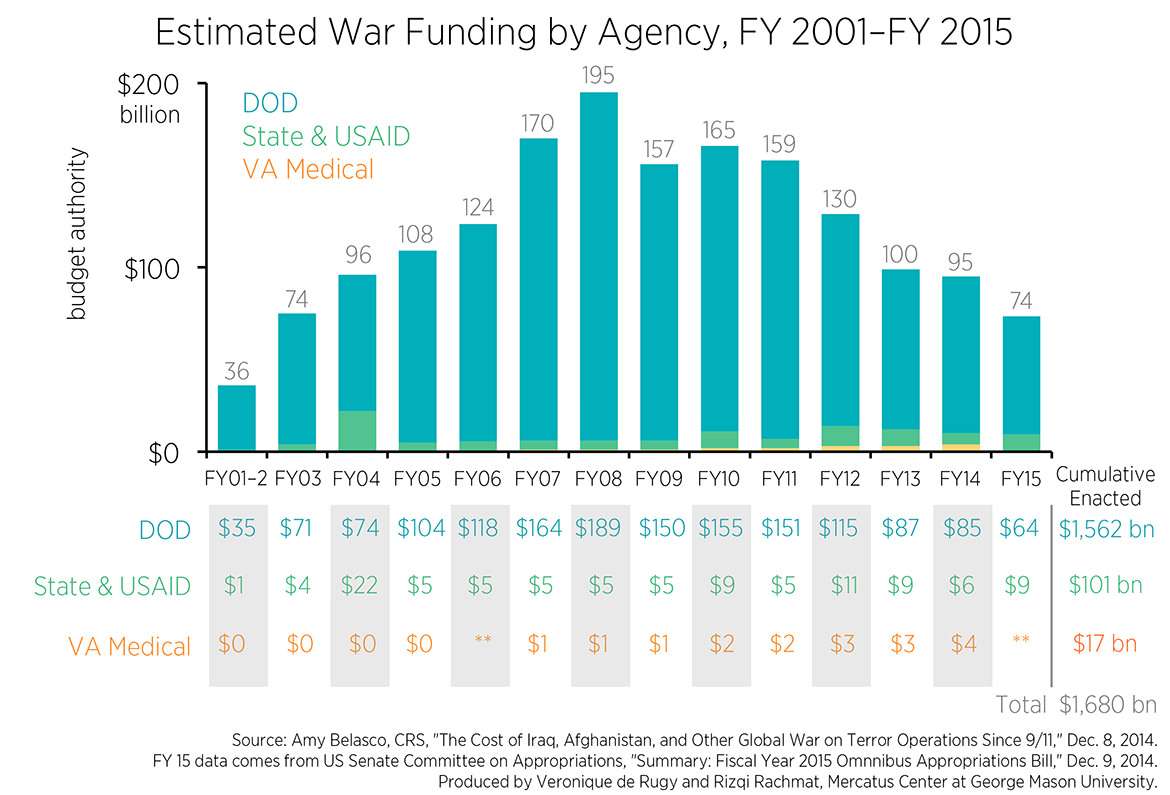Afghanistan, Iraq Direct War Spending To Date: $1.7 Trillion (and Counting)

Here we go again. On Tuesday, the president asked Congress to let him go back to war in the Middle East.
"In Iraq and Syria, American leadership?—?including our military power?—?is stopping ISIL's advance. Instead of getting dragged into another ground war in the Middle East, we are leading a broad coalition, including Arab nations, to degrade and ultimately destroy this terrorist group. We're also supporting a moderate opposition in Syria that can help us in this effort, and assisting people everywhere who stand up to the bankrupt ideology of violent extremism. This effort will take time. It will require focus. But we will succeed. And tonight, I call on this Congress to show the world that we are united in this mission by passing a resolution to authorize the use of force against ISIL."
It will be a different kind of war, he claims.
Well, maybe. One thing is sure, however. It will be expensive. War always is and it always is more expensive than originally projected. It doesn't take a crystal ball for me to know that. All it takes is a look at the direct cost of our most recent engagement in the Middle East.
To date, the direct cost of both wars is close to $1.7 trillion. As you can see in the chart above between fiscal year 2001 through fiscal year 2014, the nominal price tag of $1.6 trillion. As I wrote over at Mercatus, "Adding the war funding for fiscal year 2015 that was passed in December pushes the total to almost $1.7 trillion…. The vast majority of the funding has been allocated to the Department of Defense ($1.562 trillion). The State Department and related foreign aid efforts received $101 billion and the Department of Veterans' Affairs, $17 billion."
Those numbers will rise since they do not include the costs of long-term obligations to wounded veterans and the projected war spending going forward.
Few people remember that back in 2002, the war in Iraq was projected to cost around $50 billion. White House economist Lawrence Lindsey actually got canned after he was quoted saying that the war in Iraq would cost between $100 billion and $200 billion.
While Bush's own advisers may have raised red flags, the media and various other Washington insiders were on board that the Iraq war would be a big victory with a small price tag. As CNN reported 13 years ago:
The Pentagon has estimated a one-time cost for an Iraq war of about $50 billion—about 0.5 percent of GDP—and [Michael] O'Hanlon of the Brookings Institution has estimated the war could carry a one-time price tag of between $30 billion and $50 billion. But occupying a post-war Iraq and helping it rebuild could cost between $5 billion and $20 billion per year, O'Hanlon said, with the costs shrinking with time.
James Phillips, a research fellow at the Heritage Foundation, said he thought this annual post-war cost estimate sounded a little high.
"Once the [initial] conflict is over, Iraq is such an oil-rich nation, it can finance its own reconstruction," he said. "We would have to pay the costs of deploying forces, fuel, ammunition, etc.; but some of those would have to be paid regardless of where the troops were based."
Right. To my knowledge, there was no official price tag for the war in Afghanistan, but I'm sure it would have lowballed the actual costs.
This is no surprise, of course, since it is a common practice for those lobbying for government programs (any government) to underestimate the cost and overestimate the benefits we will get from the spending. However, it doesn't mean we should put up with it.
[Editor's note: This post was originally misattributed to Nick Gillespie.]
Editor's Note: As of February 29, 2024, commenting privileges on reason.com posts are limited to Reason Plus subscribers. Past commenters are grandfathered in for a temporary period. Subscribe here to preserve your ability to comment. Your Reason Plus subscription also gives you an ad-free version of reason.com, along with full access to the digital edition and archives of Reason magazine. We request that comments be civil and on-topic. We do not moderate or assume any responsibility for comments, which are owned by the readers who post them. Comments do not represent the views of reason.com or Reason Foundation. We reserve the right to delete any comment and ban commenters for any reason at any time. Comments may only be edited within 5 minutes of posting. Report abuses.
Please to post comments


Stimulus!
Just for perspective:
The federal debt in 2001 was $5.8TT. In 2014 it was $17.8TT, for an increase of $12TT. The cost of the wars ($1.6TT) is @ 13% of the increase. Make of that what you will.
The debt in 2009 was $11.9TT, for an increase under Obama (not counting the holdover/transition year of 2009) of $5.9TT. The war costs for the same period, per the chart above, were $649BB, or @ 11% of the increase in debt.
For Bush, the comparable percentage is @16% ($6.1TT increase in debt, with $960BB in war costs, through 2009).
Total federal spending from 2001 through 2014 was @ $40.4TT,making the war spending @ 3.9% of total outlays.
my neighbor's ex-wife makes $62 every hour on the computer . She has been out of work for five months but last month her paycheck was $18411 just working on the computer for a few hours. try this site........
?????? http://www.cashbuzz80.com